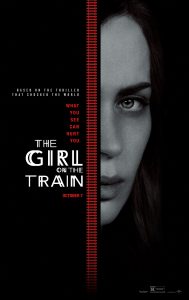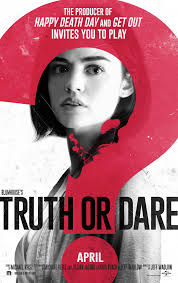Released in 2015, Paula Hawkins‘ The Girl on the Train is the fastest selling adult novel in history. This is no doubt due to it being spruiked as “The new Gone Girl” which quite frankly is a ruse because it doesn’t match it. With the film adaptation, fans eager for another Gone Girl may leave disappointed, but based on its own merits it’s an impressive feat nonetheless.
Rachel (Emily Blunt) rides the train into the city and back each day, and takes people watching to a whole new level. She becomes obsessed with watching a young couple who live in her old street, giving them imaginary identities and lives. Rachel is an alcoholic, divorced from her ex-husband Tom (Justin Theroux) who has moved on with new wife Anna (Rebecca Ferguson) and child. After seeing the mysterious woman do something that makes Rachel angry, she goes on a bender, waking up covered in blood. She has no recollection of the night before. She then discovers that the woman she saw from the train, Megan Hipwell (Haley Bennett) has disappeared.
Director Tate Taylor (The Help) and screenwriter Erin Cressida Wilson (Men, Women & Children) bring Hawkins’ novel to life in a rewarding way. Their film stays loyal to the source material while improving upon it at the same time. The film plays with memory, with repeated flashbacks each offering additional information as the audience, and Rachel, piece together the events of that night. The book is told in chapters that oscillate between Rachel, Megan, and Anna’s points of view at different stages in time. The film version stays close to this format, introducing each woman with a name title, and continuing to provide titles that confirm the point in time. This is necessary, and it would make for a very confusing film without them (see The Captive for a terrible example of how not to do flashbacks).
While there are three women’s stories at play, the focus is without a doubt on Rachel, who is played by the superb Emily Blunt in possibly her best performance to date. The book calls for a dowdy and slightly chubby actress but, you know, Hollywood. The film’s setting has also changed from London to New York because apparently alcoholism is more shameful in America. Um, okay? Even though she’s still British anyway. The setting is not that important, so I’ll allow it. Blunt is ably supported by Haley Bennett, Luke Evans and Justin Theroux, with Rebecca Ferguson perhaps the weak link. However, it’s hard to tell whether that may just be the passiveness of her character. In that case, she’s nailed it.
Danny Elfman’s score is haunting, and lingered in this reviewer’s head for some time after. There is not much of a reprieve from the drama, and this reviewer can only guess as to how viewers unaware of the story’s events will handle the tension. For those viewers who insist on reading the book before seeing the film – don’t. The film is better and you’re only going to ruin the ending for yourself. One particularly disturbing scene may be hard for some to watch, although the film will hopefully serve to add to the conversation on violence as well as alcoholism. Drinking certainly isn’t made out to be glamourous here. In fact it’s not a bad advertisement for giving it up altogether.
Having read the book, it’s difficult to say whether the film’s twist is an obvious one from the start. With any luck, The Girl on the Train will keep the uninitiated guessing and their hearts pumping to the very end. For those familiar with the book, it’s still worth seeing this thriller realised on the big screen. This reviewer took the train home after viewing, which only adds to the experience.
The Girl on the Train is in cinemas from 6th October through Entertainment One.




